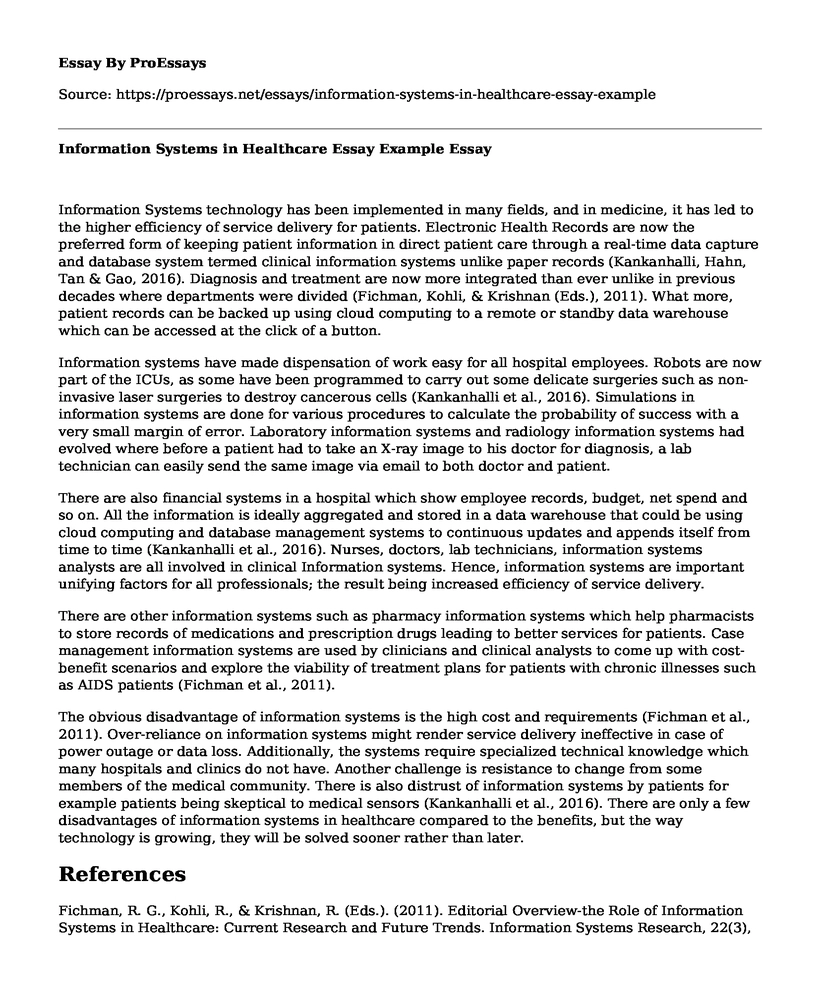Information Systems technology has been implemented in many fields, and in medicine, it has led to the higher efficiency of service delivery for patients. Electronic Health Records are now the preferred form of keeping patient information in direct patient care through a real-time data capture and database system termed clinical information systems unlike paper records (Kankanhalli, Hahn, Tan & Gao, 2016). Diagnosis and treatment are now more integrated than ever unlike in previous decades where departments were divided (Fichman, Kohli, & Krishnan (Eds.), 2011). What more, patient records can be backed up using cloud computing to a remote or standby data warehouse which can be accessed at the click of a button.
Information systems have made dispensation of work easy for all hospital employees. Robots are now part of the ICUs, as some have been programmed to carry out some delicate surgeries such as non-invasive laser surgeries to destroy cancerous cells (Kankanhalli et al., 2016). Simulations in information systems are done for various procedures to calculate the probability of success with a very small margin of error. Laboratory information systems and radiology information systems had evolved where before a patient had to take an X-ray image to his doctor for diagnosis, a lab technician can easily send the same image via email to both doctor and patient.
There are also financial systems in a hospital which show employee records, budget, net spend and so on. All the information is ideally aggregated and stored in a data warehouse that could be using cloud computing and database management systems to continuous updates and appends itself from time to time (Kankanhalli et al., 2016). Nurses, doctors, lab technicians, information systems analysts are all involved in clinical Information systems. Hence, information systems are important unifying factors for all professionals; the result being increased efficiency of service delivery.
There are other information systems such as pharmacy information systems which help pharmacists to store records of medications and prescription drugs leading to better services for patients. Case management information systems are used by clinicians and clinical analysts to come up with cost-benefit scenarios and explore the viability of treatment plans for patients with chronic illnesses such as AIDS patients (Fichman et al., 2011).
The obvious disadvantage of information systems is the high cost and requirements (Fichman et al., 2011). Over-reliance on information systems might render service delivery ineffective in case of power outage or data loss. Additionally, the systems require specialized technical knowledge which many hospitals and clinics do not have. Another challenge is resistance to change from some members of the medical community. There is also distrust of information systems by patients for example patients being skeptical to medical sensors (Kankanhalli et al., 2016). There are only a few disadvantages of information systems in healthcare compared to the benefits, but the way technology is growing, they will be solved sooner rather than later.
References
Fichman, R. G., Kohli, R., & Krishnan, R. (Eds.). (2011). Editorial Overview-the Role of Information Systems in Healthcare: Current Research and Future Trends. Information Systems Research, 22(3), 419-428.
Kankanhalli, A., Hahn, J., Tan, S., & Gao, G. (2016). Big Data and Analytics in Healthcare: an Introduction to the Special Section. Information Systems Frontiers, 18(2), 233-235.
Cite this page
Information Systems in Healthcare Essay Example. (2022, Aug 23). Retrieved from https://proessays.net/essays/information-systems-in-healthcare-essay-example
If you are the original author of this essay and no longer wish to have it published on the ProEssays website, please click below to request its removal:
- Essay Sample on Health Care Cost and Quality
- Criteria for the Diagnosis of Infection Paper Example
- Essay Sample on Violating Terms of Agreement: Know What You Sign Up For
- Zika Virus: Mosquito-Borne Threat to People - Essay Sample
- Half of Pregnant Women Unprotected From Flu: A 2017 Overview - Essay Sample
- Essay Sample on Nurse Uniforms: Hygiene & Professionalism for Healthcare Staffs
- COVID-19: Adapting to a New Normal With Digital Tools - Essay Sample







